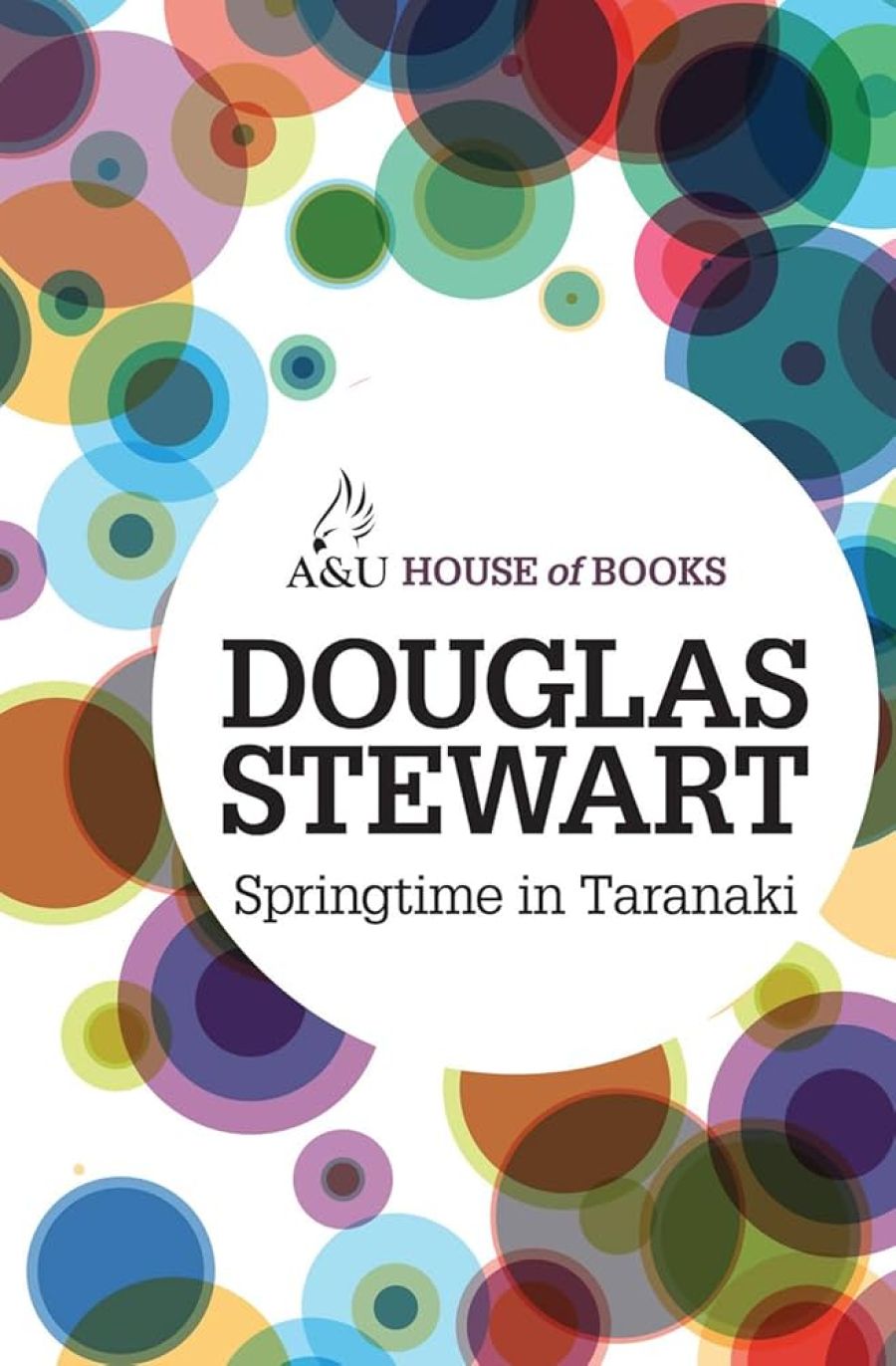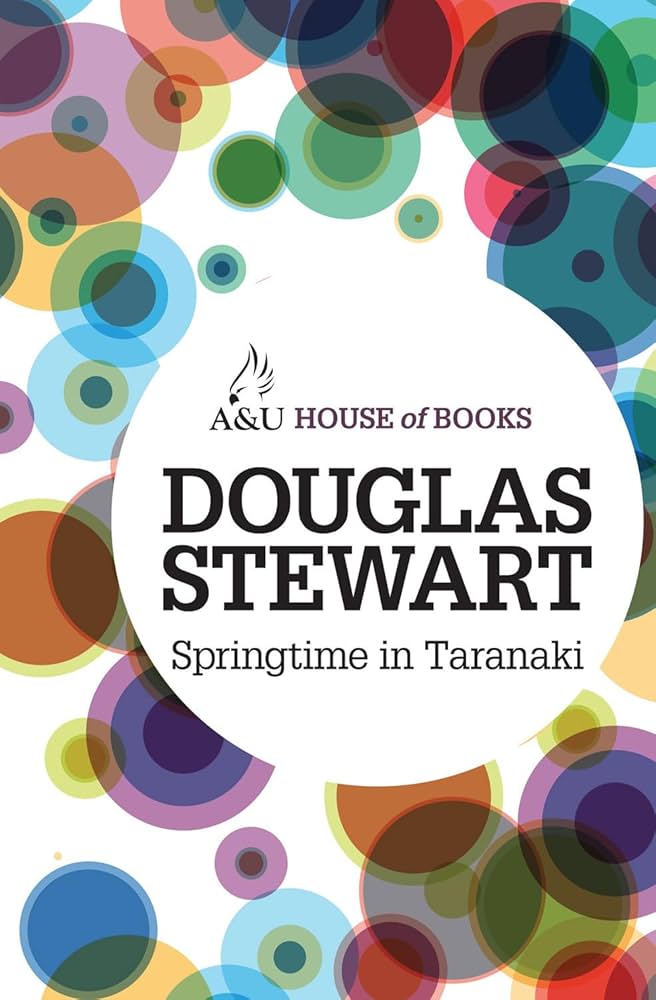
- Free Article: No
- Contents Category: Biography
- Review Article: Yes
- Article Title: Genesis of Poetry of Delicate Genius
- Online Only: No
- Custom Highlight Text:
Douglas Stewart is one of the great all-rounders, perhaps the greatest, of our literature; one recalls that Nancy Keesing once described him as probably t
Foremost as a poet, the subject matter of his poetry is astonishingly wide-ranging from ballads and narrative poems to the most delicate and delightful of nature and love lyrics. He has been a notable and inspiring literary editor; in a period that has now passed into history he so exploited the creative potentialities of radio to communicate culturally that he achieved an international reputation as a verse playwright; and his literary criticism down the years has been consistently respected by his peers.
- Book 1 Title: Springtime In Taranaki
- Book 1 Subtitle: An Autobiography of Youth
- Book 1 Biblio: Hale & Iremonger, $19.95 pb, 256 pp
- Book 1 Cover Small (400 x 600):

- Book 1 Cover (800 x 1200):

And in this book he further demonstrates how his prose reflects some of the most endearing characteristics of his poetry: its humanity; its enchanting artlessness; the sharp, enlivening passages stemming from his acute observation of places and people; above all, his pre occupation with the world of nature.
Much of this is apparent in his short stories and in his fishing reminiscences, The Seven Rivers, but never more so than in Springtime in Taranaki which one can only hope is the first of several volumes of autobiography to come. Here he has written one of the most sensitive and memorable evocations of a boyhood and adolescence that it has been my privilege to read.
‘Oh, mystery of man,’ Wordsworth apostrophised in his Prelude, ‘I see in simple childhood something of the base / On which thy greatness stands.’ This could well be the text of Stewart’s book for he was singularly fortunate in having had a family life in the province of Taranaki, on the west coast of New Zealand’s North Island, specifically in the small town of Eltham which, in the autumn of his years, brings him undiluted happiness in its recollection and its telling.
As he so feelingly writes at the beginnings of his book, ‘... in no other way can you so fully taste the richness of the earth and savour and experience the comedy, the poignance and the delight of youthful living than by growing up in a country town’. And in simple terms, that is what the book is about: growing up in Eltham, exploring his native country, and eventually leaving it in the 1930s for England and Scotland (whence his forebears hailed) and ultimately Sydney – and the beginning of a brilliant career with the Bulletin.
But, to return to his beginnings and his native hearth. ‘Every night of my life,’ he writes ‘when my dinner is served to me I remember my father and make libation to his genial shade’. Could there ever be a portrait written with such filial piety as this?:
My favourite and most characteristic memory of him is, in fact, simply of him silting at peace at his own fireside. He loved to be in the midst of his family. He was happy with his light reading, whether it was the latest Edgar Wallace, a golf book, the cheerful comedies of Dornford Yates and Sewell Ford, or the doings of those kings among the cowboys, Johnny Nelson and Hopalong Cassidy. He loved, in the cold wet Eltham winters, the comfort of the dining-room fire. He relished the soothing smoke of his tobacco and kept a rack of many pipes, curly cherrywoods, long straight briars, even a yellow meerschaum, ready to his hand. His full red lips made a pleasant soft popping noise as he opened them to let out the smoke. He wore a white and green eyeshade, as for tennis, to keep the light out of his eyes. ‘The light when you are reading should always fall on the book over your left shoulder,’ he used to advise us firmly. And there with his legs crossed in his dressing gown and slippers and his eyeshade circumnavigating his big round head, his pipe gently popping and his fingernail softly scratching, as his curious habit was, at a scrap of silk ribbon he kept for this purpose in his waistcoat pocket, night after night he took his ease among his cubs, sensuous and contented as a lion.
It is indeed in that very vein that Stewart recalls his school days, first in Eltham and then at the New Plymouth High School where he felt the first stirrings of wanting to be a poet; his pleasant if inconclusive stay at Victoria University, Wellington; and then, deciding not to follow in his father’s footsteps as a lawyer after all, his return to Eltham and its district as a journalist on local newspapers. Then, in young manhood, came the urge to travel – first around his own country (there is a joyous sequence of his adventures with a travelling roundabout show) and then to England, and, eventually, Australia.
That, in sum, is the scope of the book, but its telling is a prose delight. Stewart has that knack of turning the inconsequential into something quite absorbing and in so doing, rekindling one’s memories of one’s own youthful experiences. Let me quote two examples. We all have recollections of many Guy Fawkes’ nights; of bonfires and crackers and rockets and double-bangers. And then – how true: ‘... next day there was the curious, slightly melancholy pleasure of searching for the crackers that had failed to explode, known as “fizzers” and, holding a match to the black gunpowder as you bent them in two, duly fizzing them’.
Or take the time when
... one day riding through the ceaseless misty rain when the mountain was lost in cloud and nothing was to be seen but the white farmhouses, the dark-green pines and macrocarpas, the widespread- ing boxthorn hedges with their scarlet berries shining in the rain as the sturdy little pony cantered on for miles around the green countryside, across the river near Ngaere and out towards Mahoe and Kaponga and back by Stuart Road, suddenly I knew that I was happy beyond measure; and hugged the feeling and lived in it, and rode in it all day long. I remember, at that precise moment when the awareness of ecstasy broke upon me, looking down and seeing on my bare legs where they protruded from my sheltering oilskin overcoat, droplets of black mud from the road which Dolly had flung up as we travelled. I suppose the pleasure of defying the weather and of being safe and warm in the oilskin coat and sou'wester had a good deal to do with the delight of the day; and the excitement of doing something quite out of the ordinary; and the thrill of exploring; and the grey, misty loveliness of the countryside; but beyond all was just the joy of riding on a pony. It came from far down the ages.
Now those are passages at random, and there are many, many more like them, and one could write pages extolling their delights. Far better it is to say, read the book for yourself for it is indeed something to treasure.
And in it and through it all one sees the emergence of a poet, and such a poet – one who has over the last 50 years or so endowed us with such riches of his imaginative observation of creatures and things, rendered in tones tenderly elegaic or lyrically ebullient or joyously humorous, right from those youthful days in fact when, as he writes, ‘I stumped in ecstasy about my native countryside and hugged it to my heart and tugged from it poems that. ... found their way into my first book, Green Lions.’
He tells us of the poets and writers with whom he nourished his growing talent – Yeats, de la Mare, W.H. Davies, Edmund Blunden, Humbert Wolfe and others, and there came that time in England when he met and talked with some of them, including Blunden, Richard Church, and especially, John Cowper Powys. For of Powys he writes, ‘... he stays in my mind as one of the three people I have met in my life who have conveyed to me the impression of genius: of talent and personality quite beyond the ordinary. The other two were Norman Lindsay and Eve Langley’.
Well, there are many of us – writers, poets, near-misses, has-beens and never-was’s – who for some reason or other try to keep the flame of Australian literature flickering in what is often a hardly sympathetic environment, who would willingly and unequivocally include Douglas Stewart too in that category of genius.


Comments powered by CComment